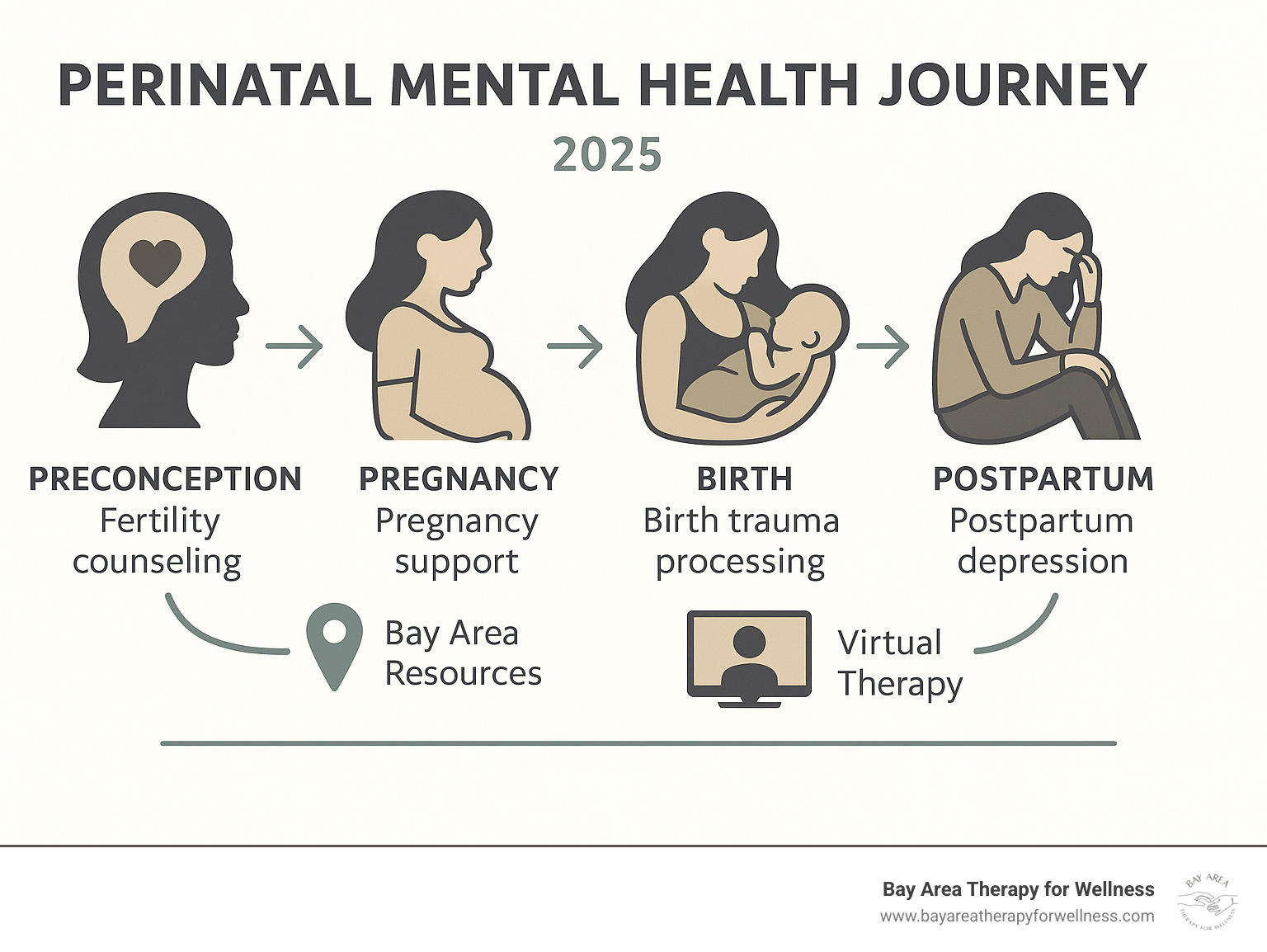Finding a Perinatal Mental Health Therapist Near Me in the Bay Area
You've always been the one with the plan. The spreadsheets, the five-year goals, the carefully curated LinkedIn profile showcasing your Bay Area success story. But here you are, Googling "perinatal mental health therapist near me" at 2 AM while your partner sleeps peacefully beside you, completely unaware that your mind is racing with questions you never thought you'd ask: What if I can't do this? What if I'm not cut out to be a mom? What if everyone else got some maternal instinct manual that I somehow missed?
As a therapist at Bay Area Therapy for Wellness, I know this: that high-achieving, detail-oriented mind that got you where you are today? It's not broken. It's just trying to steer the most significant life transitions you'll ever experience, and it's completely normal to feel like you're drowning in the process.
Why Your Type-A Brain Struggles with the Chaos of Motherhood
You're used to metrics, deadlines, and clear expectations. But pregnancy, childbirth, and early parenthood operate on their own timeline—one that doesn't care about your carefully planned maternity leave schedule or your detailed birth plan. This disconnect between your need for control and the unpredictable nature of this journey can create a perfect storm of anxiety and depression that feels foreign and frightening.
Maybe you've been tracking ovulation apps with the same intensity you once brought to quarterly reports, only to face the heartbreak of another negative test or the complex emotions surrounding in vitro fertilization treatments. Or perhaps you sailed through pregnancy feeling like you finally had something figured out, only to have childbirth not go according to plan. Now you're home with this new baby, and despite reading every parenting book available, you feel completely lost navigating the postpartum period.
Understanding Perinatal Mental Health: The Specialized Support You Need
Perinatal mental health encompasses your emotional well-being from conception through your baby's first birthday—a critical period where specialized perinatal mental health services can make all the difference. For Bay Area women accustomed to excelling in demanding careers, this period can feel particularly jarring because traditional coping mechanisms—working harder, planning better, achieving more—simply don't apply to these unique challenges.
The perinatal period brings massive physical changes, hormonal changes, and identity shifts that can trigger various mood disorders and anxiety disorders. Statistics show that perinatal mental health issues affect 1 in 5 women and 1 in 10 partners, making specialized perinatal mental health support not just helpful, but essential for many families.
Finding the Right Perinatal Mental Health Therapist for Your Bay Area Life
Look for specialized perinatal training: Your therapist should have credentials like PMH-C (Perinatal Mental Health Certification) or have advanced perinatal training, such as Stephanie Crouch's. This specialized and advanced training in perinatal mental health ensures they understand the complex intersection of hormonal changes, physical changes, and psychological adjustments during the pregnancy and postpartum period.
Consider virtual individual therapy as your lifeline: When leaving the house feels impossible and Bay Area traffic adds unnecessary stress, online therapy sessions become a game-changer. You can attend individual therapy sessions in your pajamas, with your new baby nearby, without worrying about parking in downtown San Francisco or sitting in 580/680 traffic from Livermore to San Jose.
Prioritize the consultation call: This isn't just a formality—it's your opportunity to assess whether this therapist truly understands high-achieving women like yourself and can provide the personalized support you need. Can they speak to the specific mental health challenges of balancing career ambitions with motherhood in one of the most competitive regions in the country?
Seek referrals from healthcare professionals: Your OB/GYN in Palo Alto, your midwife in Walnut Creek, or your pediatrician in Cupertino likely know which therapists specifically understand the unique pressures Bay Area families face and can connect you with appropriate perinatal mental health services.

Common Perinatal Mental Health Issues That Hit High-Achievers Hardest
Postpartum Depression: When Joy Feels Impossible
Postpartum depression affects far more new mothers than many realize, and symptoms can include persistent sadness, emptiness, or hopelessness that interferes with daily life and bonding with your new baby. You expected to feel overwhelming love and maternal bliss. Instead, you feel empty, disconnected, and guilty about not experiencing the emotions you "should" be having. The contrast between expectation and reality feels devastating when you're used to meeting every goal you set. Depression during the perinatal period requires specialized understanding and treatment approaches.
Postpartum Anxiety and Overwhelming Anxiety: When Your Planning Mind Goes Haywire
Anxiety disorders during the postpartum period can manifest as intense worry, racing thoughts, restlessness, or panic attacks, often centered on your baby's health and safety. Your brain, which once efficiently managed complex projects, now creates elaborate worst-case scenarios about your new baby. You check the monitor obsessively, research every tiny symptom, and can't shake the overwhelming anxiety that something terrible is about to happen.
Postpartum Rage: When Perfectionism Meets Sleep Deprivation
Those unexpected outbursts of anger that leave you feeling ashamed and confused? They often stem from the frustration of not being able to "optimize" your new life. When your partner seems to adjust effortlessly and return to work while you struggle with intense emotions, that rage can feel all-consuming and may indicate underlying perinatal mental health issues requiring professional support.
Birth Trauma and Difficult Childbirth Experiences
Perhaps your carefully researched birth plan went completely off course. Maybe you ended up with an emergency C-section, a NICU stay, or complications that left you feeling like your body betrayed you. Processing this deviation from expectations and the distressing thoughts that often follow requires specialized perinatal mental health support and therapeutic intervention.
Pregnancy Loss and Perinatal Loss: Grief That Doesn't Fit Timelines
Miscarriage, stillbirth, pregnancy loss, or infant loss creates a grief that operates outside normal timeframes. In a culture that values moving forward and achieving goals, perinatal loss can feel particularly isolating. These complex emotions require specialized counseling that understands the unique nature of reproductive grief and loss.
Infertility Struggles and In Vitro Fertilization Stress
For someone accustomed to achieving goals through effort and strategy, infertility can feel like a unique type of failure. The emotional and physical roller coaster of IUI, in vitro fertilization, and fertility treatment creates stress that impacts every aspect of mental health and requires specialized therapeutic support from providers who understand reproductive challenges.
Obsessive Compulsive Disorder in the Perinatal Period
Postpartum obsessive compulsive disorder can involve intrusive, distressing thoughts and repetitive behaviors or rituals focused on baby's health and safety. These symptoms may emerge during the perinatal period and can be effectively managed with evidence-based therapeutic modalities and specialized perinatal mental health treatment.
ADHD in Motherhood: When Systems Fall Apart
If you've managed ADHD through structure and systems, the chaos of new parenthood can feel overwhelming. The organizational strategies that worked in your professional practice may not translate to life with an unpredictable new baby, requiring adapted coping strategies and support.
Why Specialized Perinatal Mental Health Services Make the Difference
While any therapist can provide emotional support, perinatal mental health specialists understand the specific psychological landscape of this transition. We recognize that your struggles aren't character flaws—they're normal responses to extraordinary life transitions and the physical changes, hormonal changes, and identity shifts that occur during the perinatal period.
A general therapist might focus on basic stress management techniques, but a perinatal mental health specialist understands that your anxiety about leaving your new baby with a sitter isn't just "helicopter parenting"—it's a normal protective response that can be addressed with specific therapeutic strategies designed for new mothers and new parents.
Organizations like Postpartum Support International provide resources and training for healthcare professionals specializing in perinatal mental health, ensuring that specialists stay current with best practices for treating mood disorders and anxiety disorders during this critical period.

The Virtual Therapy Advantage for Bay Area Parents
As a solo private practice offering virtual individual therapy, I've seen firsthand how online therapy sessions transform access to perinatal mental health services for Bay Area families:
Eliminate commute stress: No more anxiety about traffic from Dublin to San Francisco or finding parking in downtown Palo Alto. You can attend therapy sessions from your home in Livermore, Pleasanton, or anywhere else in California, focusing your energy on healing rather than logistics.
Flexible scheduling: Whether you're pumping between Zoom calls from your San Jose office or trying to squeeze in self-care during naptime in Menlo Park, virtual individual therapy sessions work around your unpredictable schedule and your new baby's needs.
Baby-friendly environment: Your little one is always welcome in our therapy sessions. No need to arrange childcare or worry about feeding schedules—we'll work around whatever your new baby needs, providing compassionate support that accommodates the realities of new parenthood.
Access to specialization: Rather than settling for whoever happens to practice near your Cupertino office, you can connect with a perinatal mental health specialist who truly understands your specific mental health challenges and can provide targeted perinatal mental health services.
What to Look for in Your Perinatal Mental Health Therapist
Specialized Training and Credentials
Look for therapists with perinatal mental health certification (PMH-C) who understand the unique psychological, hormonal, and social factors affecting this life stage. This specialized training ensures your therapist can distinguish between normal adjustment difficulties and clinical mental health issues requiring specific therapeutic modalities and interventions.
Evidence-Based Therapeutic Modalities
As someone who appreciates direct communication and practical solutions, you'll want a therapist who offers evidence-based therapeutic modalities like Cognitive Behavioral Therapy (CBT), Acceptance and Commitment Therapy (ACT), and mindfulness based stress reduction techniques. These therapeutic approaches provide concrete tools for managing anxiety, processing complex emotions, and developing effective coping strategies.
Personal Connection and Understanding
The therapeutic relationship is crucial, especially during this vulnerable time. You need someone who understands the unique challenges of Bay Area life—the career demands, the cost of living stress, the cultural emphasis on achievement, and the isolation that can come with success. Finding a provider who can create a safe space for exploring these issues is essential.
My Approach: Compassionate Support for Real Struggles
I'm Stephanie Crouch, a licensed clinical social worker specializing in maternal mental health for women throughout California. As both a therapist with specialized perinatal training and a mother who has navigated these challenges personally, I bring professional expertise combined with authentic understanding to provide comprehensive perinatal mental health services.
My solo private practice approach differs from traditional therapy in several key ways:
We dig deep quickly: Your time is valuable, and this period of your new life is intense. We won't spend months on background—we'll address your immediate mental health concerns while building long-term coping strategies and resilience.
Therapy sessions are engaging and authentic: I'm not a "sit and nod" therapist. Expect dynamic conversations, practical homework, and yes, some laughter along the way. This work addressing perinatal mental health issues is serious, but it doesn't have to be solemn.
Virtual-only individual therapy: Every session happens online, eliminating the stress of commuting and allowing you to access specialized perinatal mental health services from anywhere in California.
Solo practice benefits: Working with a solo practitioner means consistency, personalized support, and the ability to truly customize our therapeutic approach to your specific mental health needs and goals.
The Consultation Process: Ensuring the Right Fit
Every potential client begins with a free consultation call. This isn't just a scheduling formality—it's a crucial step in determining whether we're well-matched for this important work addressing your perinatal mental health needs.
During our consultation, we'll discuss:
- Your specific mental health concerns and goals
- My therapeutic approach and how it might address your perinatal mental health issues
- Practical matters like scheduling therapy sessions and fees
- Whether you feel comfortable with virtual individual therapy sessions
- Any questions about my experience with mental health challenges like yours
If we determine we're not the right fit, I'll provide referrals to other qualified providers specializing in perinatal mental health services. If we decide to move forward, I'll add you to my secure client portal where you can complete paperwork electronically and schedule your first therapy session.
What to Expect from Our Perinatal Mental Health Services
Weekly or Bi-weekly Individual Therapy Sessions
We'll determine a schedule for therapy sessions that works for your new life and mental health needs, with the flexibility to adjust as circumstances change. Individual therapy sessions are typically 50 minutes and focus on your immediate concerns while building long-term resilience and better outcomes.
Evidence-Based Therapeutic Modalities
Our work together may incorporate various therapeutic modalities including:
- Cognitive Behavioral Therapy (CBT): Identifying and changing thought patterns that contribute to anxiety and depression symptoms
- Acceptance and Commitment Therapy (ACT): Learning to accept difficult complex emotions while committing to actions aligned with your values
- Mindfulness based stress reduction techniques: Developing present-moment awareness and practical strategies to reduce stress
- EMDR or ART: Processing trauma from childbirth experiences or pregnancy loss
Practical Tools and Strategies
You'll receive concrete techniques for managing anxiety disorders, improving sleep, strengthen relationships, and building confidence as a good parent. These aren't abstract concepts—they're practical coping strategies that fit into your busy Bay Area life and address the real mental health challenges you're facing.

Investment in Your Mental Health and Well-being
Individual therapy and specialized perinatal mental health services represent an investment in your mental health and your family's future well-being. Many Bay Area professionals use Health Savings Account (HSA) or Flexible Spending Account (FSA) funds to cover counseling costs.
While I don't accept insurance directly, I provide detailed insurance receipts (superbills) that you can submit to your PPO plan for potential out-of-network reimbursement. We'll discuss fees during your consultation call to ensure transparency and help you make informed decisions about your perinatal mental health care.
Who Benefits from Specialized Perinatal Mental Health Services
Individuals Experiencing Pregnancy-Related Concerns
If you're pregnant and experiencing anxiety about labor, delivery, or becoming a new parent, specialized perinatal mental health support can help you process these concerns and develop coping strategies for the life transitions ahead.
New Mothers and New Parents
Whether you're struggling with bonding, feeling overwhelmed by the demands of caring for your new baby, or questioning your ability to handle this new life, perinatal mental health services provide the specialized emotional support you need during the postpartum period.
Partners and Families
The transition to parenthood affects entire family systems. Partners struggling to adjust to new dynamics, relationship changes, or their own anxiety about parenting can benefit from targeted counseling and support.
Those Facing Loss or Trauma
Pregnancy loss, stillbirth, traumatic childbirth experiences, or NICU stays create specific types of trauma requiring specialized understanding and treatment approaches from providers trained in perinatal mental health.
Parents Managing Ongoing Challenges
Whether you're dealing with feeding difficulties, sleep challenges, concerns about your baby's health, or the complex emotions around returning to work, perinatal mental health services address the ongoing mental health challenges of early parenthood.
Group Therapy and Support Group Options
While individual therapy forms the core of my practice, I also recognize the value of connecting with other mothers facing similar challenges. Group therapy and support group participation can provide additional peer support and reduce the isolation many new mothers experience during the perinatal period.
Reclaiming Your Sense of Self Through Perinatal Mental Health Support
The goal of our perinatal mental health services isn't just symptom reduction—it's helping you rediscover your strength, confidence, and joy during this transformative period. We'll focus on:
Developing Effective Coping Strategies
Learning practical techniques for managing anxiety disorders, depression symptoms, stress, and the overwhelming demands of new parenthood that fit into your Bay Area lifestyle and provide better outcomes for your mental health.
Processing Complex Emotions and Distressing Thoughts
Creating a safe space to explore intense emotions, distressing thoughts, guilt, grief, anger, or disconnection without judgment, helping you understand these feelings as normal responses to extraordinary life transitions and the challenges of caring for a new baby.
Strengthen Relationships and Improve Communication
Improving communication with your partner, family, and support network as everyone adjusts to new roles and responsibilities, addressing the relationship changes that come with becoming new parents.
Building Parenting Confidence
Developing trust in your instincts, addressing fears about being a good parent, and finding your unique parenting style that aligns with your values while managing any anxiety about your baby's health and development.
Rediscovering Joy in Your New Life
Finding moments of connection, pleasure, and personal fulfillment even amid the chaos of early parenthood and the adjustments of the postpartum period.
Couples Therapy for New Parents
The transition to parenthood creates unique challenges for relationships. Couples therapy specifically focused on the perinatal period can help partners navigate communication changes, differing parenting approaches, and the complex emotions that arise when caring for a new baby while maintaining their relationship.

Taking the First Step Toward Better Mental Health
If you've read this far, something resonated. Maybe you recognize yourself in these descriptions of perinatal mental health challenges, or perhaps you're tired of feeling like you're drowning while everyone else seems to have figured out how to be a good parent.
Here's what I want you to know: You're not failing. You're not weak. You're not the only high-achieving Bay Area woman who thought she could handle anything life threw at her, only to discover that motherhood and the perinatal period operate by completely different rules.
The courage it takes to acknowledge that you need perinatal mental health support—especially when you're used to being the one others rely on—is enormous. That same strength that got you where you are today will serve you well in this therapeutic work.
Ready to take that first step? Contact me for your free consultation call. Let's talk about how specialized perinatal mental health services can help you navigate this transition with greater confidence, less anxiety and depression, and more joy in your new life with your new baby.
Because you deserve to feel like yourself again. You deserve to enjoy this journey, even when it doesn't look anything like what you planned.
Frequently Asked Questions About Perinatal Mental Health Services
How do I know if I need specialized perinatal mental health support versus general therapy?
If your mental health concerns center around pregnancy, childbirth, early parenthood, or related experiences like infertility or pregnancy loss, specialized perinatal mental health services offer targeted expertise that general therapy may not provide. A perinatal mental health specialist understands the unique psychological, hormonal, and social factors affecting this life stage and can better address mood disorders and anxiety disorders specific to the perinatal period.
What happens in our first therapy session?
After our initial consultation call, your first official individual therapy session provides a safe space to share what's happening for you right now during this perinatal period. We'll explore your current mental health challenges, discuss your goals, and begin developing personalized support strategies tailored to your specific situation. There's no pressure to have everything figured out—we'll take it step by step to provide the emotional support you need.
How does virtual individual therapy work with a new baby?
New babies are always welcome in our therapy sessions! Virtual individual therapy actually makes this easier since you're in your own environment with access to everything you need. If your new baby becomes fussy or needs attention during our session, we simply pause and resume when you're ready. This flexibility ensures you can access perinatal mental health services without the stress of arranging childcare.
Can you help with relationship issues related to becoming new parents?
Absolutely. The transition to parenthood creates significant relationship changes that require specialized understanding. I provide support for couples adjusting to new dynamics, communication challenges, and differing parenting approaches—all within the context of this major life transition and the unique challenges of the perinatal period.
What if I'm not sure perinatal mental health therapy is right for me?
That's exactly why I offer free consultation calls. There's no commitment—it's simply an opportunity to discuss your mental health situation, learn about my approach to perinatal mental health services, and determine whether we might be a good fit. If not, I'm happy to connect you with other qualified healthcare professionals and providers.
The path forward starts with a single conversation. When you're ready, I'm here to help you navigate this perinatal period with greater confidence and less isolation. You don't have to figure out these mental health challenges alone—compassionate support and specialized perinatal mental health services are available to help you thrive during this transformative time.

